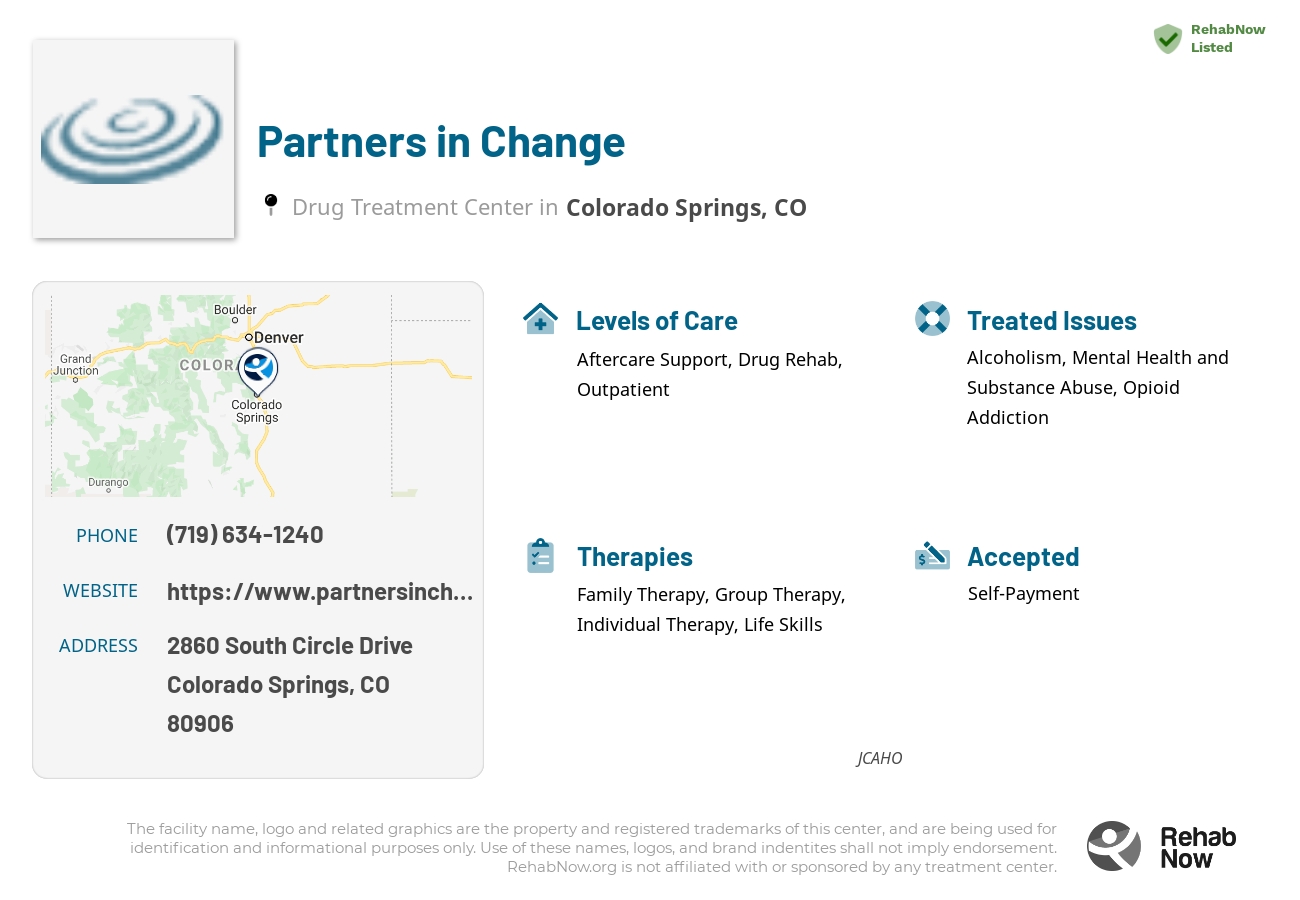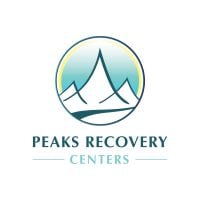
Partners in Change
Drug Rehab Center in Colorado Springs, Colorado
- Opioid Addiction
- Dual Diagnosis
- Drug Addiction
- Alcoholism
Partners in Change is a mental health and substance abuse treatment organization in Colorado offering evidence-based therapeutic services and specialized treatment programs.
About Partners in Change in Colorado
Partners in Change is a community-based, mental health, and substance abuse treatment organization in Colorado Springs, Colorado. Serving clients from El Paso County, Partners in Change offers a range of services for substance abuse, mental health and co-occurring disorders. They utilize evidence-based therapeutic services and holistic approaches to help individuals reach their treatment goals.
Partners in Change offers a variety of programs such as individualized therapy, group therapy, and family therapy. Additionally, they offer specialized treatment programs such as relapse prevention, anger management, and crisis intervention. They use evidence-based therapeutic services to create a well-rounded treatment plan for each individual. The tailored treatment plans provide a comprehensive approach to address lifestyle changes, provide emotional support, and create sustainable recovery.
Partners in Change is accredited by the Commission on Accreditation of Rehabilitation Facilities (CARF) and holds certification from the State of Colorado. They are proud to be listed as one of the top rated treatment centers in Colorado. Additionally, they provide continuing care and aftercare services such as support groups and sober living homes. They offer an array of specialized services to ensure that individuals and families get the treatment and support they need.
Genders
Ages
Modality
Additional
Accreditations

JCAHO
Conditions and Issues Treated
Opioid addiction has become a significant health problem in the United States. When a person’s life becomes unmanageable because of an opioid addiction, treatment can help them get sober. Treatment includes medical care and counseling.
“With so many people struggling with opioid addiction, we need more care and attention for those who want to quit. Opioid addicts often take opioids when they experience a painful injury – that’s how the cycle starts! When someone begins taking their medication differently than prescribed or takes an excessive amount of drugs, it means they’re hooked on drugs and in danger of overdosing.
The most successful way to beat this is through detoxing from these types treatments at Partners in Change in . Most facilities start by using medical support during the process while providing counseling services; rehabilitation comes later on after treatment has been completed successfully.
Levels of Care Offered
This center offers a variety of custom treatment tailored to individual recovery. Currently available are Aftercare Support, Drug Rehab, Outpatient, with additional therapies available as listed below.
Outpatient programs at Partners in Change, the Colorado Springs resident can live with their family while continuing with their job or studies. Treatment includes educating the patient on drug abuse, medications, and counseling sessions at the individual or group level. Outpatient treatment plans cover diagnosis, detoxification, management, and counseling. They are a popular option for those who have graduated from inpatient facilities.
Without aftercare support, addicts can easily relapse back into addiction. It is crucial to integrate the addict back into society. Aftercare support should take place after outpatient treatment has ended.
There are a few different types of aftercare support that patients can seek after completing an inpatient treatment program:
- 12 Step Self-help groups (AA, NA)
- Therapeutic communities,
- Long-term, structured sober living arrangements
- Halfway houses (residential treatment centers)
Many different support groups exist for addicts to seek help after treatment. Some are more effective than others, depending on the person’s addiction, background, and other factors.
Therapies & Programs
Individual therapy is a form of counseling where you meet with a trained professional one-on-one. Meeting with a therapist in this setting allows for a personal and trusting relationship to be built. This allows the patient to open up about sensitive or private issues they may not feel comfortable discussing in a group. Individual therapy helps identify the root causes of your addiction, which can help prevent relapse.
Family therapy is often done alongside drug treatment to help addicts stay sober. The goal of family therapy for drug addiction is to create an environment where communication can happen without judgment, hostility, or blame. The therapist will sit with the family so they can learn how to communicate differently and provide new tools for dealing with emotions so that people don’t want to drink or do drugs. It’s important for families to focus on relapse prevention plans during treatment so that if the addict feels like they want to use again, they’ll know what steps they need to take together to prevent it from happening again in the future.
Group therapy sessions are another common addiction recovery service. These group sessions typically involve six to 12 addicts who meet regularly with a trained professional for support and guidance.
During these sessions, the group shares their experiences with one another and provides feedback that can help each member avoid relapse or overcome specific obstacles they are facing in their recovery process. With this type of support and guidance, addicts can feel like they are part of a community that understands their struggles and will help them get through the hard times.
Cognitive Behavioral Therapy (CBT) focuses on the underlying thoughts and behaviors that caused the problem of addiction in the first place and may cause a relapse. Negative feelings are common in drug abuse disorders, but they can lead to co-occurring disorders if not recognized. CBT involves strategies that help to change the behavior pattern by restructuring negative thoughts into positive ones. It helps to remove these feelings, and it provides long-term benefits. Also, CBT promotes self-awareness and self-control. It can be administered as a monotherapy or as part of combination therapy.
CBT can improve the patient’s mood, reduce drug cravings and boost success rates on treatment plans. Regular practice can help individuals handle negative attitudes, thoughts, and feelings without turning to drugs or alcohol. The core belief of Cognitive Behavioral Therapy (CBT) is that one’s moods, behaviors, and actions are all connected. Individuals can improve their quality of life using CBT. It helps addicts understand the patterns of thought and feelings that cause them to use drugs or alcohol and develop a healthy response.
It’s not as simple as quitting drinking or using drugs and expecting the hard part to be over. Many addicts in recovery have discovered that they need to improve skills such as time management, organization, communication, socialization, and self-esteem. Learning certain life skills can help those who are struggling with addiction.
Payment Options Accepted
For specific insurance or payment methods please contact us.
Additional Details
Specifics, location, and helpful extra information.
Colorado Springs, Colorado 80906 Phone Number(719) 634-1240 Meta DetailsUpdated November 25, 2023
Staff Verified
Partners in Change Patient Reviews
There are no reviews yet. Be the first one to write one.
Colorado Springs, Colorado Addiction Information
The Centennial State has slipped to a ranking of 12th in the country for drug abuse. Each year around 24% of the state's population uses illegal drugs while nearly 5% of its population abuses alcohol. Substance-related deaths in Colorado were responsible for 15.12% between 2008 and 2017. Fortunately, Colorado drug and alcohol addiction treatment are available to help a person overcome addiction.
10.6% of Colorado Springs adults reported binge drinking and 11.7% of adults reported using illicit drugs. From 2006 to 2016, the number of drug overdose deaths more than tripled in Colorado Springs. Drug addiction can lead to a wide variety of problems, including crime, violence, and health issues. It's important to find a facility that offers the level of care you need to give yourself the best chance for success.
Treatment in Nearby Cities
- Yuma, CO (143.4 mi.)
- Fairplay, CO (71.3 mi.)
- Arvada, CO (71.1 mi.)
- Cascade, CO (11.7 mi.)
- Idaho Springs, CO (75.7 mi.)
Centers near Partners in Change



The facility name, logo and brand are the property and registered trademarks of Partners in Change, and are being used for identification and informational purposes only. Use of these names, logos and brands shall not imply endorsement. RehabNow.org is not affiliated with or sponsored by Partners in Change.





